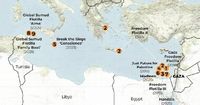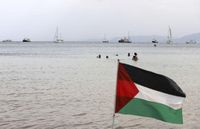For the second consecutive night, the Global Sumud Flotilla—a coalition of dozens of vessels carrying activists and symbolic humanitarian aid—found itself under attack while docked in Tunisian waters, reigniting international debate over Israel’s blockade of Gaza and the lengths to which both sides will go to assert their positions.
The latest incident unfolded late on September 9, 2025, when the Alma, a British-flagged boat, was targeted off the port of Sidi Bou Said. According to CCTV footage shared by the flotilla and reviewed by multiple outlets including the Associated Press and Al Jazeera, flaming projectiles fell from the sky, exploded on the deck, and set off a blaze. "A drone came and dropped another incendiary device," said Thiago Ávila, a Brazilian activist and spokesperson for the flotilla, in remarks reported by the AP. Miraculously, the crew managed to contain the fire, and no injuries were reported.
This attack came just one night after a similar strike on the Portuguese-flagged Family vessel, which was also docked in Tunisian waters. Both ships serve as motherships for the mission, supporting smaller boats and hosting some of the flotilla’s most prominent members, including Swedish climate activist Greta Thunberg and former Barcelona mayor Ada Colau. Video verified by Al Jazeera showed an incendiary device plummeting onto the Family boat, followed by an explosion and fire. A passenger on board, Miguel Duarte, recounted seeing a drone hovering overhead before the blast.
While Tunisian authorities initially denied that drones were involved—suggesting instead that the first fire was caused by a discarded cigarette or lighter—the mounting video evidence and the near-identical nature of both attacks have cast doubt on that explanation. Tunisia’s Interior Ministry has since described the incidents as "premeditated acts" and launched an investigation, though it has not yet identified any suspects or formally attributed blame.
Francesca Albanese, the UN special rapporteur for the occupied Palestinian territories, weighed in on the situation, telling Truthout that “video evidence suggests that a drone — with no light so it could not be seen — dropped a device that set the deck of the Alma boat on fire. Expert sources suggest that it was an incendiary grenade wrapped in plastic materials dipped in fuel, which could have been set on fire before landing on the ship.” The group posted images of the charred remnants, describing the object as a "charred electronic device."
Despite the attacks, the flotilla’s resolve has not wavered. In a statement, organizers declared, “These repeat attacks come during intensified Israeli aggression on Palestinians in Gaza, and are an orchestrated attempt to distract and derail our mission. The Global Sumud Flotilla continues undeterred. Our peaceful voyage to break Israel’s illegal siege on Gaza and stand in unwavering solidarity with its people presses forward with determination and resolve.”
Saif Abukeshek, a steering committee member, was blunt in his assessment: “Israel continues to breach international law and terrorise us. We will sail to break the blockade on Gaza no matter what they do.” He added, “If we are inspired by the resilience of such people, how can we give up [after] just two incidents?”
Israel, for its part, has not commented on the latest accusations, maintaining a traditional silence in the face of such allegations. Historically, Israeli officials have dismissed similar flotillas as "publicity stunts," arguing that the blockade is necessary to prevent the smuggling of weapons into Gaza. In recent days, Israel’s far-right Public Security Minister Itamar Ben-Gvir has gone a step further, submitting a proposal to classify flotilla participants as security prisoners—a move that could see them detained for weeks if intercepted. He has also advocated for similar treatment of Israeli protesters demonstrating against the war, though both proposals are considered unlikely to pass.
The Mediterranean, as many observers note, is among the world’s most surveilled maritime regions, with a constant presence of manned and unmanned military aircraft. Still, drone and munitions experts cited by the AP believe the devices used in the recent attacks could have been commercially available drones modified to carry incendiary payloads—a tactic that, while technologically unsophisticated, is undeniably effective and difficult to trace.
The Global Sumud Flotilla is not the first to attempt to break the Israeli blockade. Since 2008, numerous activist-led maritime missions have set sail for Gaza, some managing to reach their destination but most being intercepted, sometimes violently, by Israeli naval forces. The 2010 raid on the Mavi Marmara stands out as a grim milestone: Israeli commandos boarded the Turkish-owned ship in international waters, resulting in the deaths of ten activists and dozens of injuries. The incident drew global condemnation, strained Israel-Turkiye relations, and led to ongoing legal and diplomatic fallout.
Subsequent flotillas—such as Freedom Flotilla II in 2011, Freedom Flotilla III in 2015, and the Just Future for Palestine mission in 2018—faced sabotage, diplomatic pressure, and interception at sea. More recently, in May 2025, the vessel Conscience was struck by armed drones off the coast of Malta, injuring several activists. In July, the Madleen and Handala were both seized by Israeli naval forces in international waters, their crews detained and later deported.
This year’s Global Sumud Flotilla represents the largest such effort to date, with delegations from 44 countries and more than 50 boats committed to the journey. Organizers stress that the mission is unaffiliated with any government or political party. Their stated goal is to deliver humanitarian aid and, perhaps more importantly, to draw international attention to the ongoing blockade and the humanitarian crisis in Gaza.
The flotilla departed Barcelona on September 1, 2025, and arrived at Sidi Bou Said on September 7, where it planned to rendezvous with additional vessels before continuing toward Gaza. Crowds have gathered in Tunisian ports to show support, with local authorities delaying departure only due to weather conditions, not security concerns.
As the flotilla prepares to resume its voyage, the world watches closely. Whether this latest mission will succeed in reaching Gaza remains uncertain, but its organizers are adamant: "Our peaceful voyage... presses forward with determination and resolve." In a region where symbolism and spectacle often matter as much as substance, the story of the Global Sumud Flotilla is far from over.





